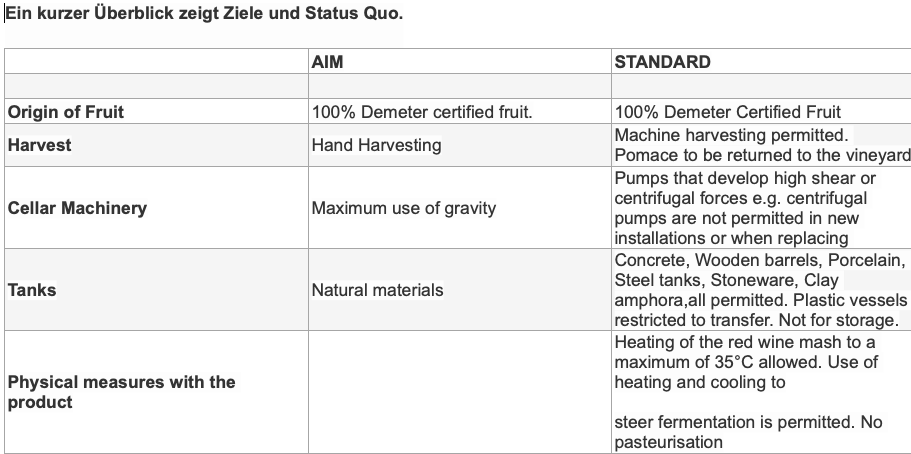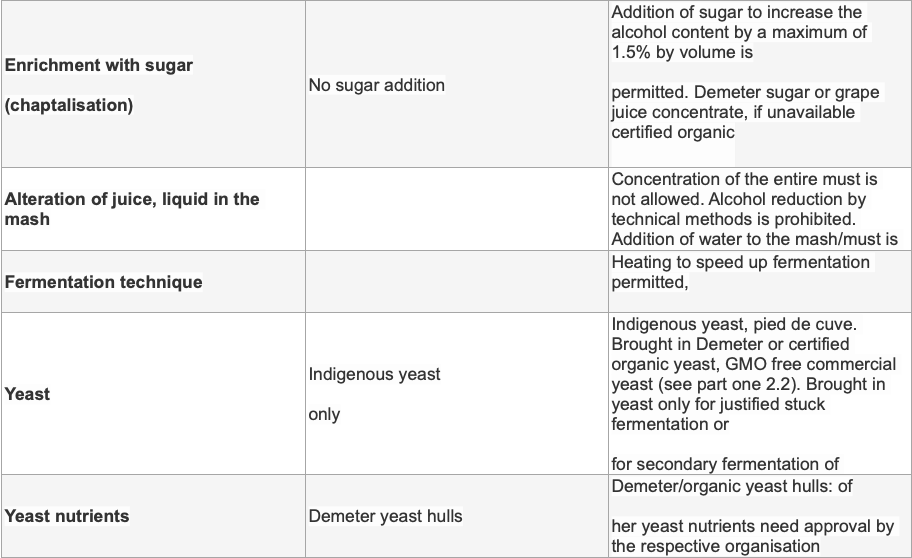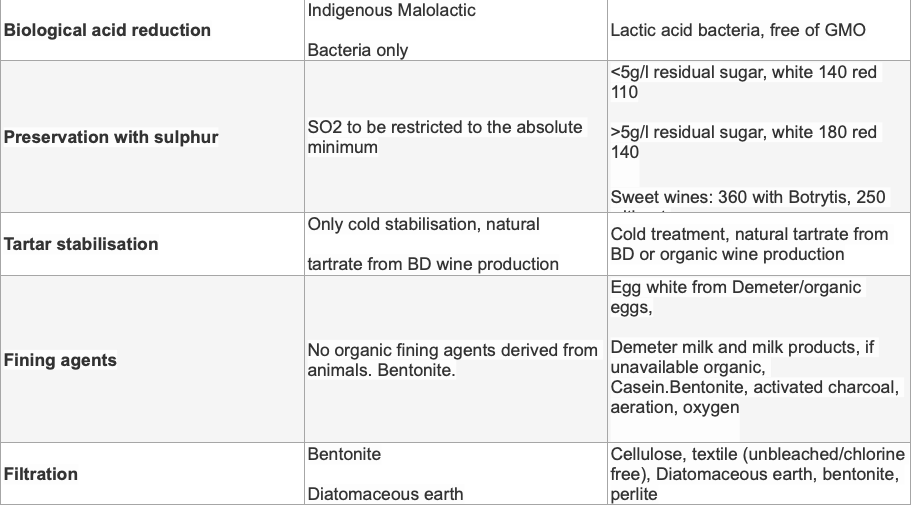DEMETER
Demeter umfasst den größten Teil biodynamisch arbeitender Winzer weltweit. Der Vereinigung kommen zwei ganz entscheidende Aufgaben zu: das Verfassen der Regulative für biodynamischen Weinbau (und Empfehlungen in Sachen Kellertechnik) und die Einhaltung derselben.
Die Richtlinien von Demeter International lesen sich folgendermaßen (da es keinen Sinn macht, sie in neue Worte zu fassen, hier ganz einfach das Original):
Scope and guiding principles:
The grapes and the producing farm must be certified. Certification must be through a certifier which itself is authorised by a Demeter Organisation. This Demeter Organisation itself needs to be recognised by the international community of Demeter producers and processors, in other words be a member of Demeter International, an association incorporated in Darmstadt, Germany.
The work carried out in the wine cellar is a rounding off of the processes underlying grape production in the vineyard. As little technology is employed as possible and the fewest aids and additives used in all stages of the process. Aids and additives currently permitted should be reduced or phased out as processing techniques improve. The procedures should respect and be in harmony with the surroundings, the location, and the people involved in production. The primary aim is to at least maintain the quality present in the Biodynamic fruit. (For that reason harvesting the grapes by hand is preferred in order to guarantee the highest possible raw material quality for processing.)
All processing steps and methodologies used to process both the grapes as well as the ensuing products are to follow the following principles:
-The product shall be of high quality in sensory terms and digestibility, and taste well
–Sulphur dioxide is to be used to the minimum.
-Processes that require large inputs of energy or raw materials are to be avoided
–Aids and additives that raise environmental or health questions, from the point of view either of their origin, their use or their disposal, are to be avoided.
–Physical methods are preferable to chemical methods.
All processing by-products, be they organic residues or waste water, are to be dealt with so that negative effects on the environment are minimised. The standards are defined in terms of a positive list of processes, ingredients, additives and aids. All other methods and materials not mentioned in this standard are excluded from the production of Demeter wine. Nevertheless, in order to emphasis the strict prohibition of some common processes and materials, the following are not permitted:
-The use of genetically modified micro-organism
–Potassium hexacyanoferra
–Ascorbic acid, Sorbic acid
–PVPP (Polyvinylpolypyrrolidone)
–Diammonium phosphate
–Isinglass (Sturgeon swim bladder), blood and gelatine




Liste demeterzertifizierter Winzer
1701 s.r.l.
Abbazia Santa Anastasia s.p.a.
Amerighi Stefano
Ampeleia Società Agricola
Ausonia
Tenuta Migliavacca
Az. Agr. Le Sincette
Caiarossa
Casale
Ciù Ciù
Corte Sant’Alda
Dichristin Andreas – Tröpfltalhof
Duemani
Fabbrica di San Martino
La Busattina
Fattoria di Caspri s.r.l.
Foradori
La Collina
La Colombaia
Les Granges s.s.
Al di là del Fiume
Morella
Musella
Nuova Cappelletta
Palazzo Tronconi
Patrick Uccelli
Pian Dell’Orino
Podere Còncori
Podere La Cerreta
Podere Le Ripi s.r.l.
Rivetto
San Fereolo
Sequerciani Soc. Agr. semplice di Gerber R. & C.
Soc. Agricola Biodinamica Carlo Noro
Tenuta di Ghizzano
Cosimo Maria Masini
Tenuta di Valgiano
Tenuta Mara
Tenuta Santa Lucia
Tenute Dettori Soc. Agr. S.
Terra di Briganti
Terre di Giotto di Michele Lorenzetti
Terrevive
Valle Reale
Zanolari Marcel – Fattoria San Siro

